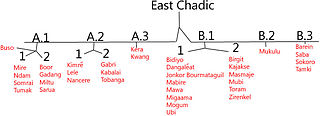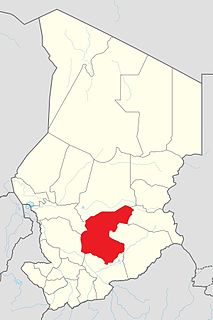Related Research Articles
Bagirmi is the language of the Baguirmi people of Chad, belonging to the Nilo-Saharan family. It was spoken by 44,761 people in 1993, mainly in the Chari-Baguirmi Region, as well as in Mokofi sub-prefecture of Guéra Region. It was the language of the Kingdom of Baguirmi.
The Bua languages are a subgroup of the Mbum–Day subgroup of the Savanna languages spoken by fewer than 30,000 people in southern Chad in an area stretching roughly between the Chari River and the Guéra Massif. They were labeled "G13" in Joseph Greenberg's Adamawa language-family proposal. They are ultimately part of the Niger–Congo family, and have exerted a significant influence on Laal.

The three dozen East Chadic languages of the Chadic family are spoken in Chad and Cameroon.
The Bolgo language is a member of the Bua languages spoken in south-central Chad, in the villages of Koya, Boli, Gagne, and Bedi southeast of Melfi, by about 1,800 people. Speakers also make up the majority of the population of Sorki canton in Chinguil sub-prefecture.

Guéra is one of the 23 regions of Chad, created in 2002 from the former Guéra prefecture. The region's capital is Mongo. As of 2009, the population of the region was 553,795.
Guéra is one of four departments in Guéra, a region of Chad. Its capital is Melfi.
Bidiyo is an Afro-Asiatic language spoken in south central Chad.
Dangaléat is an Afro-Asiatic language spoken in central Chad. Speakers make up the majority of the population of Migami Canton in Mongo, Chad.
Migaama is an Afro-Asiatic language spoken in central Chad. Speakers make up the majority of the population of Bang Bang, Chad.
Birgit is an Afro-Asiatic language spoken in southeastern Chad. Speakers are found in Moubi Goz Canton, Kouka Margni Sub-prefecture and in Moubi Zarga Canton, Mangalmé Sub-prefecture.
Masmaje is an Afro-Asiatic language spoken in central Chad. There are speakers in Moubi Hadaba Canton, Bitchotchi Sub-prefecture.
Mubi is an Afro-Asiatic language spoken in central Chad. It forms one of the Mubi languages, a group of East Chadic languages.
Barein is a Chadic language spoken in south central Chad.
Saba is an Afro-Asiatic language spoken in south central Chad. Speakers are found in Sorki canton in Chinguil sub-prefecture.
Sokoro is an Afro-Asiatic language spoken in central Chad. Dialects are Bedanga and Sokoro. Speakers make up the majority of the population of Gogmi Canton in Melfi, Chad.
Mokilko, or Mukulu, is a Chadic language spoken in central Chad. The local name for the language is Gergiko. This is the name used for mother-tongue literacy materials. Mukulu is the name of a village.
Kenga is a Bongo–Bagirmi language of Chad. Speakers make up the majority of the population in Kenga canton in Bitkine sub-prefecture.
Koke is an Adamawa language of Chad. Speakers are found in Daguela Canton, Chinguil Sub-prefecture, Guéra Region.
Abtouyour is one of four departments of Chad in Guéra, a region of Chad. Its capital is Bitkine.
Herrmann Rudolf Jungraithmayr is an Austrian Africanist and retired university professor. Until 1996, he was the chair of African linguistics at the Johann Wolfgang Goethe University in Frankfurt am Main, Germany.
References
Dakouli, Padeu, Antje Maass, and David Toomey. 1996. Rapid appraisal of the Saba language of the Guera, Chad. N’Djamena: Association SIL. Manuscript.
Jungraithmayr, Herrmann. 1961. Beobachtungen zur tschadohamitischen Sprache der Jegu (und Jonkor) von Abu Telfan (République du Tchad). Afrika und Übersee 45:95–123.
Jungraithmayr, Herrmann. 1964. Die Sprache der Jegu im zentralen Sudan und ihre Stellung innerhalb der tschadohamitischen Sprachen. Wiener Zeitschrift für die Kunde des Morgenlandes 59/60:44–51.
Rendinger, Général de. 1949. Contribution à l’étude des langues nègres du Centre-africain. Journal de la Société des Africanistes. 19(2). 143–194. Online: http://www.persee.fr/web/revues/home/prescript/article/jafr_0037-9166_1949_num_19_2_2599.